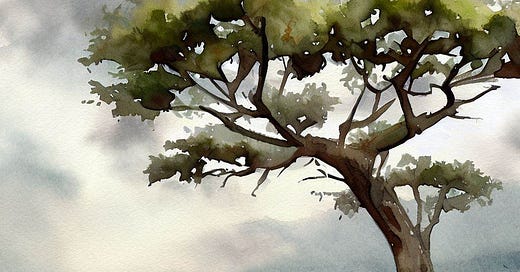Elephant eyelashes and zebra gas
Mashonaland East, Zimbabwe.
When I left Tennessee, summer was welding into August and the swampiest months in Knoxville. Now I'm south of the equator with a cup of coffee (two sugars), looking out at an African savanna. We've just eased into spring. The cherry blossoms are blooming, their pink petals falling on the African clay. The air smells like dirt. It's wild, alive, and somehow free.
Nature in her beauty.
The cool air drifts across the yellow grasses from the highlands to the east. It flirts with a big msasa tree here in the middle of the outpost. Msasa’s remind me of southern live oaks: their branches twist about without a perceivable pattern. Something doesn't have to have immaculate symmetry to be lovely: God doesn't have OCD. The leaves are small, chartreuse, and oval-shaped, rustling at a high pitch in the breeze. The sage-colored moss is growing up the msasa's trunk enveloping it in faded green.
I'm at a nature reserve. The buildings have thatched roofs pointed up at sharp angles. Most of the thatching is deep brown, like the dirt, but bright yellow is exposed in a few places. This is where baboons have grabbed on as they slid down to the ground. Baboons here are like raccoons for us: pests.
A bird makes a clicking sound like over-tightening a soda bottle. My friend Shelley says it's a warbler. I just met Shelley a few days ago, but she's the type to whom you want to tell your entire story. But for now, we'll talk about warblers.
Our safari guide walks over. The dark, black skin around his mouth cracks into a smile often. Though sometimes I can't tell he's joking because he sounds grave when he speaks, like when he discouraged us from donating our fingers to the rhino when we fed them.
He drove us through the reserve and pointed out a few wildebeest grazing separate from the main pack. The young males often leave the main body (or are kicked out) and join a bachelor herd. It reminds me of a church lobby. "This is the herd of losers," he says, and we laugh.
We met an elephant named Mark. I might have thought he was a house walking towards us if he didn't have tusks. Yet we're close enough to see the waspy, black hairs growing on his trunk and feel how cool the ivory is on his tusks. Have you ever seen an elephant's eyelashes? They're as long as drinking straws.
Mark will be friendly to you if you feed him some of those little cubes he likes. He gently eased me out of the way with his trunk to get to some on the ground. When I say "gently eased," I mean I nearly fell over and understood that this beast could chuck me across the field into the baobab trees if he wanted. But he didn't. Nice guy, that Mark.
Thankfully there are no monkeys in the trees above me today. So nothing will drop shells on my table and annoy the dogs into barking. A warthog scuttles about outside the fence, looking for scarps. They fall onto the knees of their front legs to eat and are afraid of nothing if there's food. I've seen them get swatted at by elephants, giraffes, and cape buffalo — unfazed.
I want to wax philosophically about the "pregnant zebra" I saw yesterday and how beautiful she was. We saw her east of the great rocks in the center of the park, and then she popped up again by the lake overlook at sunset. But our guide taught us it wasn't pregnant: zebra bloat when they graze and pass the gas later. So I wasn't seeing the beauty of the circle of new life here on the plains. I just saw a zebra who needed to fart.
Nature in her beauty.





